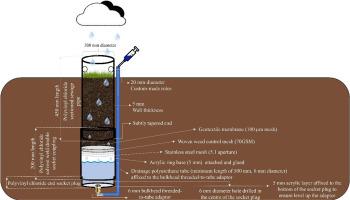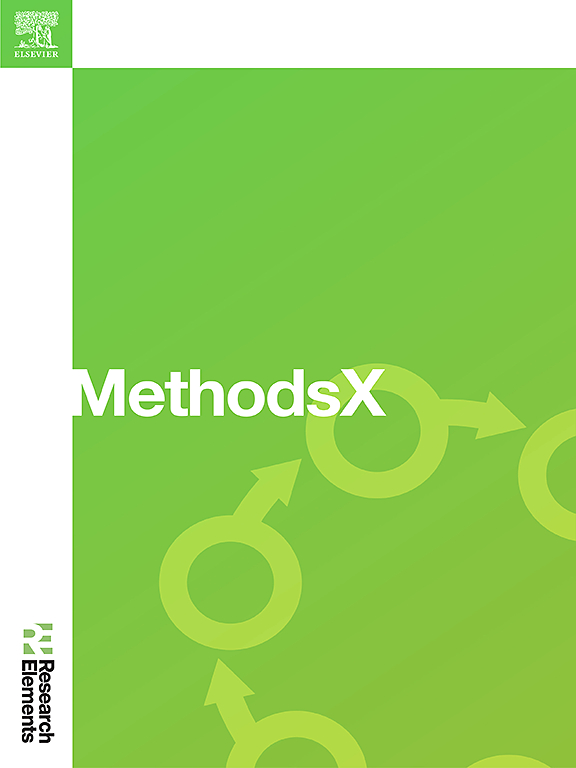A method to evaluate enhanced rock weathering using intact soil monoliths under field conditions
IF 1.6
Q2 MULTIDISCIPLINARY SCIENCES
引用次数: 0
Abstract
Enhanced rock weathering (ERW) has attracted considerable attention as a carbon dioxide removal (CDR) strategy. However, a reliable method for accurately measuring, monitoring, and verifying carbon dioxide (CO2) removal, particularly under field conditions, remains elusive. Here we describe a method for installing soil monoliths in an in situ buried apparatus that allows collection of water draining through a soil, undisturbed by external environmental factors that may affect similar apparatus located above ground. The method provides a robust, cost-effective means of collecting, developing, and establishing soil monoliths, allowing through drainage soil water sample collection and analysis, and so facilitating estimation of ERW CO2 removal. A 200 mm diameter polyvinyl chloride (PVC) pipe is inserted into the soil to extract intact monoliths from a site of interest, withdrawn and then fitted with a basal double socket coupling and end cap for leachate collection. It is buried to reproduce soil environmental conditions, and water is collected via a sampling tube to surface. Validity was confirmed through an experimental trial with 36 monoliths over 6 months. This method enables accurate chemical analysis of solute draining through the soil monolith, which can be used to validate models of ERW efficacy.
- •PVC pipes are inserted into the target soil and subsequently extracted to retrieve intact soil monoliths
- •PVC sockets, equipped with a mesh and a geotextile membrane in the middle to retain the collected intact soil monolith and prevent soil particle transport, are then attached to the PVC pipe
- •PVC caps, featuring a small drainage tube attached to its outer side, are used to collect the leachate at the bottom part of the system.

在野外条件下利用完整土壤单体评估岩石风化强化的方法
强化岩石风化(ERW)作为一种二氧化碳去除(CDR)策略,已经引起了广泛关注。然而,准确测量、监测和验证二氧化碳(CO2)去除情况的可靠方法,尤其是在野外条件下的去除情况的可靠方法,仍然没有找到。在这里,我们介绍了一种在原地埋设装置中安装土壤单体的方法,这种方法可以收集通过土壤排出的水,不受外部环境因素的干扰,而这些因素可能会影响地面上的类似装置。该方法提供了一种稳健、经济高效的收集、开发和建立土壤单体的方法,允许通过排水系统收集和分析土壤水样本,从而有助于估算战争遗留爆炸物的二氧化碳去除率。将直径为 200 毫米的聚氯乙烯(PVC)管插入土壤中,从感兴趣的地点提取完整的单体,然后抽出,再安装一个基底双承插接头和端盖,用于收集沥滤液。将其埋入地下以再现土壤环境条件,并通过采样管将水收集到地表。通过对 36 块单体进行为期 6 个月的实验测试,证实了该方法的有效性。这种方法能够对通过土壤单体排出的溶质进行精确的化学分析,可用于验证战争遗留爆炸物的功效模型。将聚氯乙烯管插入目标土壤,然后抽出,以回收完整的土壤单体--然后将聚氯乙烯插座连接到聚氯乙烯管上,插座中间装有网眼和土工织物膜,以保留收集到的完整土壤单体并防止土壤颗粒迁移--聚氯乙烯管帽用于收集系统底部的沥滤液,管帽外侧装有小型排水管。
本文章由计算机程序翻译,如有差异,请以英文原文为准。
求助全文
约1分钟内获得全文
求助全文
来源期刊

MethodsX
Health Professions-Medical Laboratory Technology
CiteScore
3.60
自引率
5.30%
发文量
314
审稿时长
7 weeks
期刊介绍:
 求助内容:
求助内容: 应助结果提醒方式:
应助结果提醒方式:


